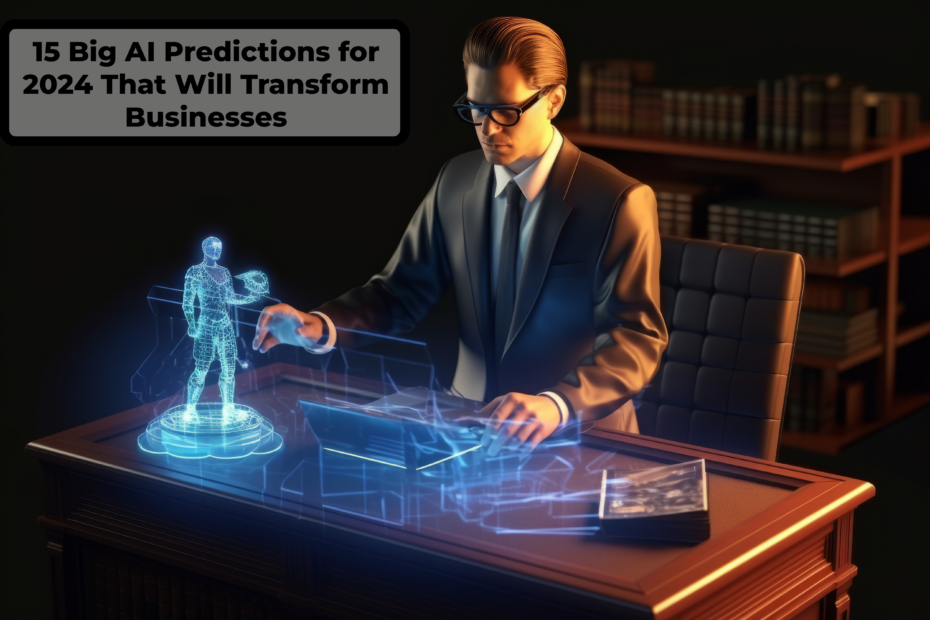Artificial Intelligence (AI) is developing at a never-before-seen rate and is now an essential component of corporate operations in many different sectors. To stay competitive as 2024 approaches, businesses need to keep abreast of new developments. This article examines 15 major AI predictions that will transform companies in 2024.
1. AI-Driven Hyperpersonalization in Marketing
By examining individual tastes, activities, and buying histories, artificial intelligence (AI) will allow companies to provide highly customized client experiences. Segmentation will give way to one-on-one, customized experiences in marketing efforts.
Impact:
- Higher customer retention
- Increased ROI on marketing campaigns
2. AI-Powered Virtual Assistants and Chatbots
Response times and customer service expenses will decrease as virtual assistants grow more perceptive and able to engage in human-like interactions. Chatbots will be able to answer more complicated consumer inquiries on their own.
Impact:
- Improved customer satisfaction
- Round-the-clock support with reduced overhead
3. Generative AI for Content Creation
Generative AI techniques will be used by businesses more and more to automate the development of content, such as product descriptions, blogs, and social media posts. Workflows will be streamlined while quality is maintained.
Impact:
- Reduced content production time
- Cost savings on creative resources
4. AI in Supply Chain Optimization
AI systems will forecast interruptions and suggest fixes to improve distribution, logistics, and inventories. Supply chains driven by AI will become more flexible, reducing losses.
Impact:
- Lower operational costs
- Reduced supply chain risks
5. AI-Enabled Decision Intelligence for Managers
Business executives will benefit from AI’s data-driven insights, predictive analytics, and decision-guiding simulations, which will increase operational accuracy and efficiency.
Impact:
- Faster decision-making
- Higher accuracy in forecasting
6. AI in Cybersecurity for Threat Detection
AI-based solutions will provide advanced threat detection and prevention for companies of all sizes by proactively identifying and reducing cyberthreats before they become more serious.
Impact:
- Enhanced data security
- Protection against evolving cyber threats
7. AI-Driven Employee Upskilling and Training Programs
AI will make corporate training more efficient and interesting by tailoring learning courses for staff members according to skill gaps and career objectives.
Impact:
- Improved workforce productivity
- Higher employee retention rates
8. AI-Enhanced Customer Insights and Behavior Analysis
Businesses will be able to improve their goods and services by using AI tools to evaluate consumer behavior across several touchpoints and provide actionable information.
Impact:
- Deeper understanding of customer needs
- More targeted product development
9. Increased Adoption of AI-Powered Automation in HR
AI solutions will automate performance management, payroll, and recruitment, relieving HR professionals of administrative duties.
Impact:
- Streamlined HR operations
- Reduced bias in hiring decisions
10. AI in Predictive Maintenance for Equipment
Predictive maintenance models will be implemented by manufacturers and heavy machinery-dependent businesses to prevent downtime by anticipating possible problems.
Impact:
- Reduced maintenance costs
- Increased operational efficiency
11. AI-Powered Healthcare Solutions
AI will improve patient outcomes and alter healthcare services by advancing patient monitoring systems, individualized treatment plans, and diagnostic tools.
Impact:
- Faster and more accurate diagnoses
- Improved patient care
12. AI for Sustainable Business Practices
Greener practices will be promoted by AI technologies that help businesses optimize energy use, cut waste, and efficiently monitor sustainability projects.
Impact:
- Lower environmental impact
- Enhanced compliance with regulations
13. AI-Backed Financial Forecasting and Fraud Detection
AI will improve risk management, fraud detection, and financial forecasting, allowing companies to continue operating with transparency and confidence.
Impact:
- More reliable forecasts
- Faster fraud detection
14. AI in Retail: Autonomous Stores and Recommendations
AI-powered autonomous stores will provide smooth checkout-free experiences, and AI recommendation engines will generate tailored buying recommendations.
Impact:
- Enhanced in-store experiences
- Higher customer engagement
15. AI and the Rise of AI-Ethics Committees
Businesses will establish ethics committees to ensure ethical AI use as its role grows, with an emphasis on algorithmic fairness, data protection, and societal effect.
Impact:
- Increased consumer trust
- Ethical and transparent AI operations
Conclusion
Businesses that embrace AI are expected to undergo significant change in 2024. The effects will be seen throughout industries, from automation and hyperpersonalization to ethical AI practices and predictive maintenance. Businesses can gain a competitive edge and open up new growth prospects by staying ahead of these trends.
FAQs
1. What is AI-driven hyperpersonalization in marketing?
AI-driven hyperpersonalization leverages data on individual preferences, activities, and purchase histories to provide tailored customer experiences beyond traditional segmentation.
2. How will AI-powered virtual assistants and chatbots evolve in 2024?
AI-powered virtual assistants will engage in more natural, human-like conversations, handling complex customer queries autonomously and offering 24/7 support.
3. What is generative AI, and how will it impact businesses?
Generative AI refers to models that create new content like blogs, product descriptions, and social media posts, reducing production time and saving creative resources.
4. How will AI improve supply chain management?
AI will predict disruptions and recommend optimizations for logistics, inventories, and distribution, minimizing operational risks and reducing costs.
5. What is decision intelligence, and how will AI support it?
AI-powered decision intelligence provides predictive insights and data-driven simulations, helping managers make faster and more accurate decisions.
